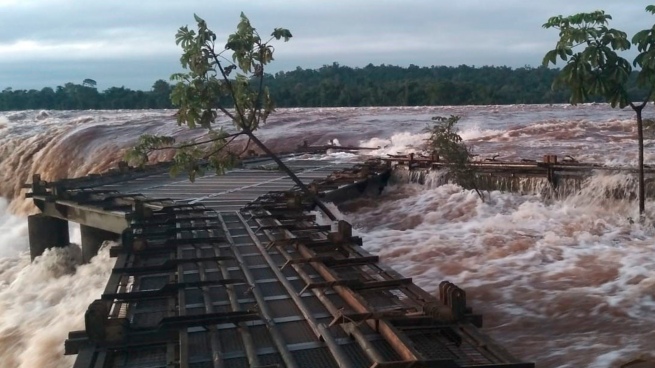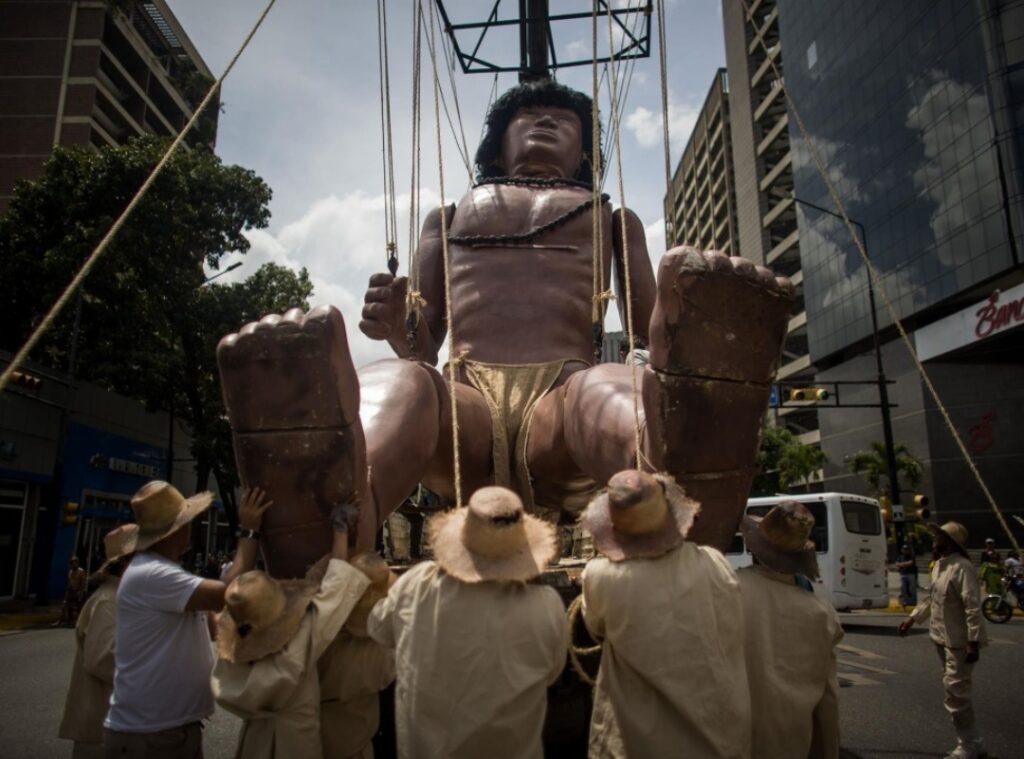The rise of the rivers Iguazu and Uruguaydue to the intense rains in the area of the high basins, in Brazilian territory, caused evacuations for the overflows of the watercourses and the closure of the Iguazú National Park in Misiones, was officially reported this Wednesday.
In the province, the most affected communes are those located on the banks of the Uruguay River, on the border with Brazil.
In the city of El Soberbio they were six families evacuated During the course of the day, residents of the Unión and Chivilcoy neighborhoods, according to reports from the mayor of that commune some 200 kilometers northeast of Posadas.
The town is always affected when the Brazilian hydroelectric dam Foz do Chapecó has to open its gates.
?️?In the last hours there was #rains strong in Missions. The accumulated precipitation has already exceeded 80 mm in some localities, and a flood was registered in the Iguazú Falls.
⚠️The rains and storms of varying intensity will continue in the area.?Vía @MeteoNacho. pic.twitter.com/gvG3tlmQCE
– SMN Argentina (@SMN_Argentina) October 12, 2022
“It is estimated that it will exceed 13 meters because the number of millimeters that it rained are many in the Uruguay River basin and the amount of cubic meters (m³) that Chapecó is releasing is equivalent to more than 20,000 m³/s,” Mayor Roque Soboczinski told a Posadas radio station on Wednesday.
“This is equivalent to overcoming the last two or three floods we had. We are going to be bordering 14 meters,” the community chief clarified.
The border crossing by raft in the port of El Soberbio-Porto Soberbo (Brazil), was suspended from this Wednesday morning, since the service is cut from 7.50 meters.
The drinking water service was suspended due to the effect of the flash floods, “everything that is the pump system is covered and it is automatically out of service for a security issue,” it was reported.
In the riparian zone of San Javier, the Uruguay River grew at a rate of 5 centimeters per houraccording to a report from the Naval Prefecture, for which the inhabitants of the place remained on alert.

The activity in the port was still normal in the international passage between San Javier and Porto Xavier, through the passenger boat and raft service, although a significant rise in flow was expected for Wednesday night.
Services could be suspended if the Uruguay River continues with this growing trend and reaches 7.70 meters, so the residents of the riverside area remained attentive to reports from the Argentine Naval Prefecture based in the town.
In Alba Posse the situation was one of expectation, no evacuees yet but the river continued to grow at an average of 40 cm per hour, also due to the effect of the Foz do Chapecó dam.
The Alba Posse-Porto Mauá international passage (raft) was suspended, as confirmed by the mayor.
The situation in the Iguazú National Park
For its part, the Iguazú National Park was evacuated and for security reasons it was closed to visitors “until further notice,” according to a statement released Wednesday by the National Parks Administration.
“Due to the extraordinary flooding of the Iguazú River the Cataratas area was closed until further notice“, adds the statement.
At 12:10 this Wednesday the last train left for Garganta del Diablo and after an analysis, at 2:00 p.m. they began to evacuate the circuit due to the work to close the walkwayswhich are carried out for the safety of the visitor and to protect the walk.
The rains in the upper basins caused the flow to grow considerably during the weekend and almost 5,000 cubic meters per second were registered in Cataratas, which this Wednesday reached 8,000 cubic meters.
The security protocols that are in force, determine that when a flow greater than 6,000 cubic meters is registered from the concessionaire company in conjunction with the administration of the national park, they evaluate preventively closing the circuit.
That is why the walkways of the circuits were lowered to avoid damage and access to tourists was not allowed.
In this case, the Brazilian hydroelectric dams Baixo do Iguazú and Caxias, both on the Iguazú River, had to open the gates to relieve the load by releasing the surplus.
Moconá Provincial Park
Meanwhile, the Moconá Provincial Park, with the Moconá Falls, was closed to visitors because the transit through the access bridge to the walk, over the Yabotí stream, was completely covered by water.
The nautical rides in the tourist walk were suspended since in the area the river reached 15 meters.
Another bridge closed to vehicular traffic is the one located over the Pindaytí stream, on coastal provincial route 2, which joins the towns of Alba Posse and Colonia Aurora.
The bridge known as “Balneario 4 Puentes”, which connects the towns of 9 de Julio and Colonia Victoria, crossing the Piray Miní stream, was also temporarily closed.
While, from the Yacyretá Binational Entity (EBY) it was reported today that the tributary flows to the dam increased as a result of the rainfall registered in Brazilian territory mainly, whose accumulated amounts were in the order of 260mm.


















